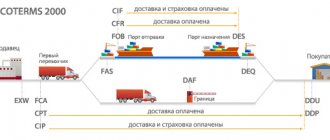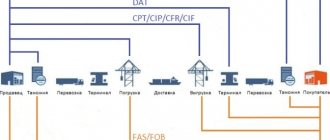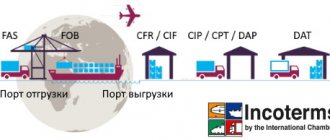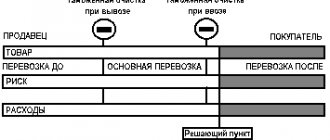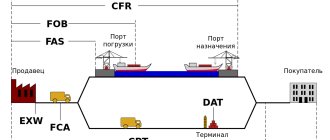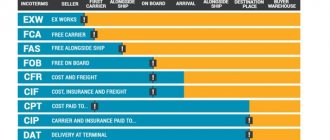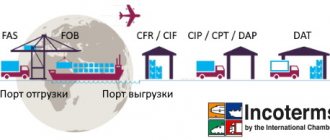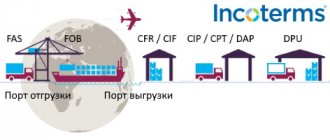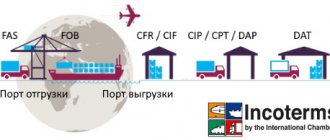- Responsibilities and risks of the seller (supplier)
Go to the list of all Incoterms terms
When carrying out international trade, parties to foreign economic activity are guided by the Incoterms rules as amended in 2010. Until January 1, 2011, Incoterms 2000 terms were in force. If imports or exports are coming in 2021, you will need to rely on the rules adopted seven years ago.
In total, in the new edition the number of terms is 11 instead of 13 in the previous version of Incoterms. There are new designations: DAT, which regulates the delivery of products at the terminal, and DAP, which determines the delivery of goods to their destination. The last term will be discussed in our article.
What does DAP delivery mean, what does it stand for?
Delivery conditions DAP Incoterms 2010 - decoding “Delivered At Point” named point of destination means that the seller has fulfilled his delivery obligations when he has provided the buyer with goods released under the customs regime of export and ready for unloading from a vehicle arriving at the specified destination.
The new DAP Incoterms 2021 delivery terms came into force on January 1, 2021.
Incoterms 2010 classification
Terms of delivery of goods for any type of transport
EXW / Ex Works – Ex-factory
FCA / Free Carrier - Free carrier
CPT / Carriage Paid to - Carriage paid to
CIP / Carriage and Insurance Paid to - Transportation and insurance paid to
DAT / Delivered at Terminal
DAP / Delivered at Place
DDP / Delivered Duty Paid
Terms of delivery of goods for sea and inland water transport
FAS / Free Alongside Ship - Free along the side of the ship
FOB / Free on Board - Free on board
CFR / Cost and Freight - Cost and freight
CIF / Cost Insurance and Freight - Cost, insurance and freight
Responsibilities under the basic terms of delivery DAP (DAP)
According to the delivery basis DAP Incoterms 2010
The seller is obliged to pay the costs and freight necessary to deliver the goods to the specified destination, perform export customs clearance for the export of goods with payment of export duties and other fees in the country of departure, but the seller is not obliged to complete customs formalities for the import of goods, pay import customs duties or carry out other import customs procedures upon import. If the parties intend to place on the seller all the risks and costs of completing import customs formalities for the import of goods, it is advisable to use the term DDP Incoterms 2010.
DAP term
can be used when transporting goods by any type of transport, including multimodal transport. The word “carrier” means any person who, on the basis of a contract of carriage, undertakes to provide or organize the transportation of goods by rail, road, air, sea and inland waterway transport or a combination of these modes of transport.
Distribution of costs and risks between the carrier and the cargo owner
One of the biggest risks for contracting parties is the choice of delivery terms. Specifically, who, when and how much will pay for transportation.
It should be recalled here that contracts are most often concluded long before the cargo is sent. And at the time of shipment, the transportation price may differ significantly from that specified in the contract. The carrier himself also takes risks by stipulating the cost of his services long before the start of transportation.
Ideally, the amount of freight due to the carrier should cover all future expenses (fuel, crew salaries, loading and unloading, repairs and maintenance of the vessel, port duties) and the risks of the carrier. However, in a competitive environment, the carrier has to indicate a deliberately lower price. Thus, the freight amount may not reimburse the shipowner for all costs.
DAP price, payment terms and transfer of ownership
DAP price means that the contract (invoice or customs) price for a product includes the sum of the cost of the product itself, export customs clearance of this product with payment of export duties and other fees and the cost of delivery (freight) to the specified destination.
Delivery terms DAP Incoterms
do not indicate the price for the goods and the method of payment, do not regulate the transfer of ownership of the goods or the consequences of violation of the contract. The price and transfer of ownership must be determined in the terms of the purchase and sale agreement. The trade term DAP indicates which party to the sales contract must carry out the necessary actions for transportation and customs clearance, when and where the seller transfers the goods to the buyer, and what costs each party bears.
Contract price and what is the delivery basis?
In international trade, when concluding contracts, it is usually clearly stated who will bear certain costs and, accordingly, what the price of the goods will be. Thus, the contract price is the price fixed in the purchase and sale document (contract). The very distribution of responsibilities of the parties for insurance and payment of transportation costs, determination of the moments of transfer of risks and property rights from the seller to the buyer is called the delivery basis .
Differences between DAP and FCA delivery conditions
The difference between DAP and FCA delivery terms is the delivery of the goods. In simple words, according to the terms of delivery DAP : the goods, at the expense of the seller, have passed export customs clearance, are transported to the specified destination and are ready for unloading. According to the delivery basis FCA Incoterms 2010: goods that have undergone export customs clearance at the seller’s expense are only loaded into the vehicle. The differences between the DAP delivery terms and other terms are presented in the table of differences in Incoterms 2010.
To which group of conditions can DAP be classified?
Incoterms DAP is part of term group D. It describes the different methods of delivering goods and represents an arrangement with maximum liability (both cost and risk) for the seller rather than the buyer. At one time there were 5 cuts in group D. Now there are only 3 of them.
Previously, there were three terms in this group to indicate the condition of delivery of goods to a place:
- DAF - Delivered at the Border.
- DES - "Delivered from ship."
- DEQ - "Delivered on the Waterfront."
Now these 3 concepts are simplified.
The delivery location is now identified as follows: DAT - “Delivered to Terminal” or DAP - “Delivery to Destination”. This is explained by the fact that the increase in the volume of scheduled transportation, as well as the transportation of groupage cargo to the point specified in the contract, has led to the fact that other terms have become outdated.
We continue to look at the decryption. The term DDU is “Unpaid Delivery Duties.” He was completely excluded. Instead, they proposed the term DDP, that is, “Payment of Duty for Delivery.”
Be careful because many websites still use the old abbreviations. Most likely, they have ambiguities caused by old designations. These points can be confusing, which threatens to increase costs when drawing up an international transportation agreement. They may cost you more than you expected.
Relevance of using the DAP basis
Today, the delivery conditions of DAP Incoterms as amended in 2010 are considered outdated, because On January 1, 2021, the new rules of Incoterms 2021 came into force. However, the International Chamber of Commerce only recommends, but does not oblige, the use of DAP Incoterms 2021 delivery conditions, therefore, in supply contracts you can refer to the DAP Incoterms 2010 delivery basis.
In Incoterms 2010, the terms DAT (Delivered at Terminal) and DAP (Delivered at Destination) replaced the following Incoterms 2000 terms: DAF (Delivered at Frontier), DES (Delivered Ex Ship), DEQ (Delivered Ex Quay) and DDU (Delivered Ex Ship). without paying duties).
>
Responsibilities of the seller under the terms of DAP (DAP) | Responsibilities of the buyer under the terms of DAP (DAP) |
| A.1. DELIVERY OF GOODS IN ACCORDANCE WITH THE AGREEMENT The Seller is obliged, in accordance with the purchase agreement, to provide the buyer with the goods, a commercial invoice or equivalent electronic communication, and any other evidence of compliance that may be required under the terms of the purchase agreement. | B.1. PAYMENT OF THE PRICE The buyer is obliged to pay the price of the goods stipulated in the purchase and sale agreement. |
| A.2. LICENSES, CERTIFICATES AND FORMALITIES The Seller must, at his own expense and risk, obtain any export license or other official certificate and, if required, complete all customs formalities for the export of goods and for their transit through third countries. | B.2. LICENSES, CERTIFICATES AND FORMALITIES The Buyer must, at his own expense and risk, obtain any import license or other official certificate, and also carry out, if required (see Introduction paragraph 14), all customs formalities for the import of goods. |
| A.3. CONTRACTS OF CARRIAGE AND INSURANCE a) Contract of carriage. The seller must contract, at his own expense and on customary terms, for the carriage of the goods to the agreed point at the named place of destination by the usual route and in the customary manner. If such a point is not agreed upon or determined by the practice of this type of delivery, the seller may choose the most suitable point for him at the named place of destination b) Insurance contract - no obligation. | B.3. CONTRACTS OF CARRIAGE AND INSURANCE a) Contract of carriage - no obligations. b) Insurance contract - no obligations. |
| A.4. DELIVERY OF GOODS The Seller is obliged to provide the goods to the Buyer on a vehicle ready for unloading at the specified point, if any, at the specified destination, if this is specified in the contract of carriage. | B.4. ACCEPTANCE OF DELIVERY The Buyer must accept delivery of the goods immediately upon delivery in accordance with Article A.4. and unload the goods from the arriving vehicle at the agreed destination, if under the contract of carriage these costs are not borne by the seller. |
| A.5. TRANSFER OF RISK The Seller is obliged subject to the provisions of Article B.5. bear all risks of loss or damage to the goods until they are delivered in accordance with Article A.4. | B.5. PASSION OF RISK The Buyer must bear all risks of loss or damage to the goods from the time of delivery in accordance with Article A.4. The Buyer shall, if he fails to comply with the obligation to give notice in accordance with Article B.7., bear all risks of loss of or damage to the goods from the expiration of the agreed date or the end date of the fixed delivery period. The condition, however, is that the goods comply properly with the contract. This means that the goods must be properly identified, that is, clearly separated or otherwise identified as the goods that are the subject of the contract. |
| A.6. ALLOCATION OF COSTS The seller is obliged, subject to the provisions of Article B.6.: to bear all costs associated with the goods until they are delivered in accordance with Article A.4., as well as to pay freight and all costs arising from Article A.3.a) , including the costs of loading the goods, which, according to the contract of carriage, are borne by the seller, and - to pay, if required, all costs associated with the completion of customs formalities for export, as well as other duties, taxes and other charges payable upon export of the goods, and costs associated with its transit transportation through third countries, in cases where these costs, according to the contract of carriage, are borne by the seller. | B.6. ALLOCATION OF COSTS The Buyer is obliged, in accordance with the provisions of Article A.3.a: to bear all costs associated with the goods from the moment of their delivery in accordance with Article A.4., to bear all additional costs if he fails to fulfill his obligation in accordance with Article B .2. or give notice in accordance with Article B.7. The condition, however, is that the goods comply properly with the contract. This means that the goods must be properly identified, that is, clearly separated or otherwise identified as the goods that are the subject of the contract. |
| A.7. NOTICE TO THE BUYER The Seller shall give the Buyer sufficient notice that the goods have been delivered in accordance with Article A.4, and shall also give the Buyer any other notice required to enable it to take such measures as are normally necessary to obtain the goods. | B.7. NOTICE TO THE SELLER If the buyer has the right to determine the time of shipment of the goods and/or destination, he must duly notify the seller about this. |
| A.8. PROOF OF DELIVERY, TRANSPORT DOCUMENTS OR EQUIVALENT ELECTRONIC COMMUNICATIONS The seller must provide the buyer at his expense with a normal transport document or documents (for example, a negotiable bill of lading, non-negotiable sea waybill, proof of inland waterway transport, air waybill, rail waybill, road waybill or mixed waybill). transportation) in accordance with Article A.3. In the event that the seller and buyer have agreed to use electronic communications, the documents mentioned above may be replaced by equivalent electronic messages (EDI). | B.8. PROOF OF DELIVERY, TRANSPORT DOCUMENTS OR EQUIVALENT ELECTRONIC MESSAGES The Buyer must accept the provisions provided in Article A.8. transport document, if it complies with the terms of the sales contract. |
| A.9. INSPECTION - PACKAGING - LABELING The seller must bear the costs associated with the inspection of the goods (e.g. quality, size, weight, quantity) necessary to deliver the goods in accordance with Article A.4. The seller is obliged, at his own expense, to provide the packaging (except in cases where it is customary in this branch of trade to send the goods stipulated by the contract without packaging) necessary for the transportation of the goods organized by him. The packaging must be properly labeled. | B.9. GOODS INSPECTION The Buyer shall bear the costs of any pre-shipment inspection of the goods unless such inspection is required by the authorities of the country of export. |
| A.10. OTHER OBLIGATIONS The Seller is obliged, at the request of the Buyer, to provide the latter, at his expense and risk, with full assistance in obtaining any documents or equivalent electronic messages (other than those mentioned in Article A.8.) issued or used in the country of dispatch and/or in the country of origin goods, and which the buyer may need to import the goods or, if necessary, for their transit through third countries. The seller is obliged to provide the buyer with all the information necessary to carry out insurance. | B.10. OTHER OBLIGATIONS The Buyer must bear all costs and fees associated with the receipt of documents or equivalent electronic communications as provided in Article A.10., as well as reimburse the Seller for expenses incurred by the latter as a result of its assistance to the Buyer. |
General information
Incoterms are a series of predefined commercial rules published by the International Chamber of Commerce (ICC) related to international commercial law. They are used in foreign trade transactions or procurement processes, as their use is encouraged by trade councils, courts and international lawyers.
Consisting of three-letter trade terms related to general contractual sales practices, Incoterms rules are intended to clearly define the challenges, costs and risks that arise in connection with the international movement of goods. The rules are often included in a foreign economic sales contract, reflecting the agreements reached on responsibilities, costs and risks arising as a result of the parties entering into an economic relationship with a foreign partner. However, the Incoterms normative document is not a contract or a law. It also does not affect prices and does not determine the currency of the transaction.
It must be kept in mind that Incoterms have been revised several times, so there are different versions. The document was last reissued in 2010. This edition is used most often.
Who is responsible for customs clearance in the country of export?
Once the goods are ready for shipment, necessary packing is carried out by the seller at his own expense to ensure that the goods reach their final destination safely. All necessary legal formalities in the country of export are carried out by the seller at his own risk, that is, he is fully responsible for ensuring that the goods can leave the country of export without problems. His responsibilities also include preparing documents for the cargo. The seller is responsible not only for export formalities, but also for possible nuances in the transit country.
